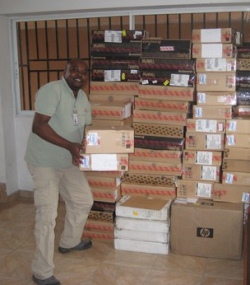
Meet...Isaac Kwamy, World Vision International
Associate Director, Humanitarian Information Systems & Telecommunications, Humanitarian & Emergency Affairs
Isaac waited more than three hours to send his 218 kBs of data via radio link from the Democratic Republic of Congo (DRC) to Switzerland. The intention was that a Swiss company would help him develop a better way to calculate salaries of 320 employees at the ‘Centre Medical Evangelique'. Previously, he had been doing this all by hand. Within months, representatives had come to DRC, developed a database, taught Isaac how to use it and even donated computers to the NGO.
Now, 18 years later, as Associate Director of Humanitarian Information Systems and Telecommunications for the Humanitarian and Emergency Affairs department of World Vision International (WVI), Isaac Kwamy looks back on those days and laughs. "I managed to computerise an organisation/company payroll system at age 18!"

Since then, Isaac has worked with a number of humanitarian organizations - including Medair, Tearfund, World Relief and Samaritan's Purse - before arriving at World Vision UK in 2005. "Humanitarian operations have always been my passion," he says. "My life has been extremely changed and affected by humanitarian work."
Isaac joined the Humanitarian Emergency Affairs department of WVI in 2008 as an Emergency Response ICT Specialist, and has worked his way up since then. As Associate Director, he is responsible for strategically leading ICT emergency response operations, preparedness and planning, by equipping and building capacity to respond better in emergencies.
Isaac is also the focal point within WVI for the ETC and a 2009 graduate of the IT Emergency Management Training course. Funded by the partnership between Vodafone Foundation and the World Food Programme (WFP), this training course focuses on developing IT and telecoms experts capable of managing the ICT response to humanitarian emergency operations.
"We implemented a similar training internally within WVI in the Latin America and Caribbean region, Middle East and Eastern Europe, and East Africa," says Isaac. "We are now working with West and Southern Africa for this training as well."
In large-scale emergencies, Isaac deploys to lead the WVI ICT response operation. "I set up the complete ICT programme, from recruiting staff and designing the strategy, to budgeting and forecasting the next six months of operations. I ensure technology is used to enable our operations." After the Haiti earthquake, Isaac worked closely with teams from NetHope and Inveneo on the pioneering NGO broadband initiative. This project saw long-distance Wi-Fi technology, installed in the offices of various NGOs in and beyond Port-au-Prince.
"Collaboration between aid agencies and the private sector made a big difference during the earthquake response in Haiti. We focused on developing these relationships and being able to create a solid network with their support.
To this day, our Haiti National Office has the biggest private point-to-point network in the country, thanks to our private sector partners."
Isaac was also one of the driving forces behind the NGO ETC Coordinator role; a position established for the first time in Haiti to encourage and sustain collaboration between UN agencies and NGOs.
"Instead of working in the corporate world, I would rather strategize around how we can address the position of donors through partnership with them to have enough resources to address the needs of those who really need it," says Isaac.
"What I like about the field is that you can see the impact of your efforts straightaway. It is witnessing the amazing impact of humanitarian work that gives me the ‘oomph' to keep going."
One of Isaac's key objectives is to see that field offices are well-prepared and equipped to better respond when disasters strike.
"IT is one of the most advanced sectors in the world. All industries need IT. As IT professionals, we must keep up to speed, but these skillsets are more often seen in the private sector than the aid sector. If they do exist in the aid sector, then it is mainly in head offices or Regional Hubs."
"We are now beginning to see the cutting-edge IT from the corporate world, in the aid world as well. We need this not at HQ, but at grass roots level so that when a disaster happens, not all of us have to deploy."